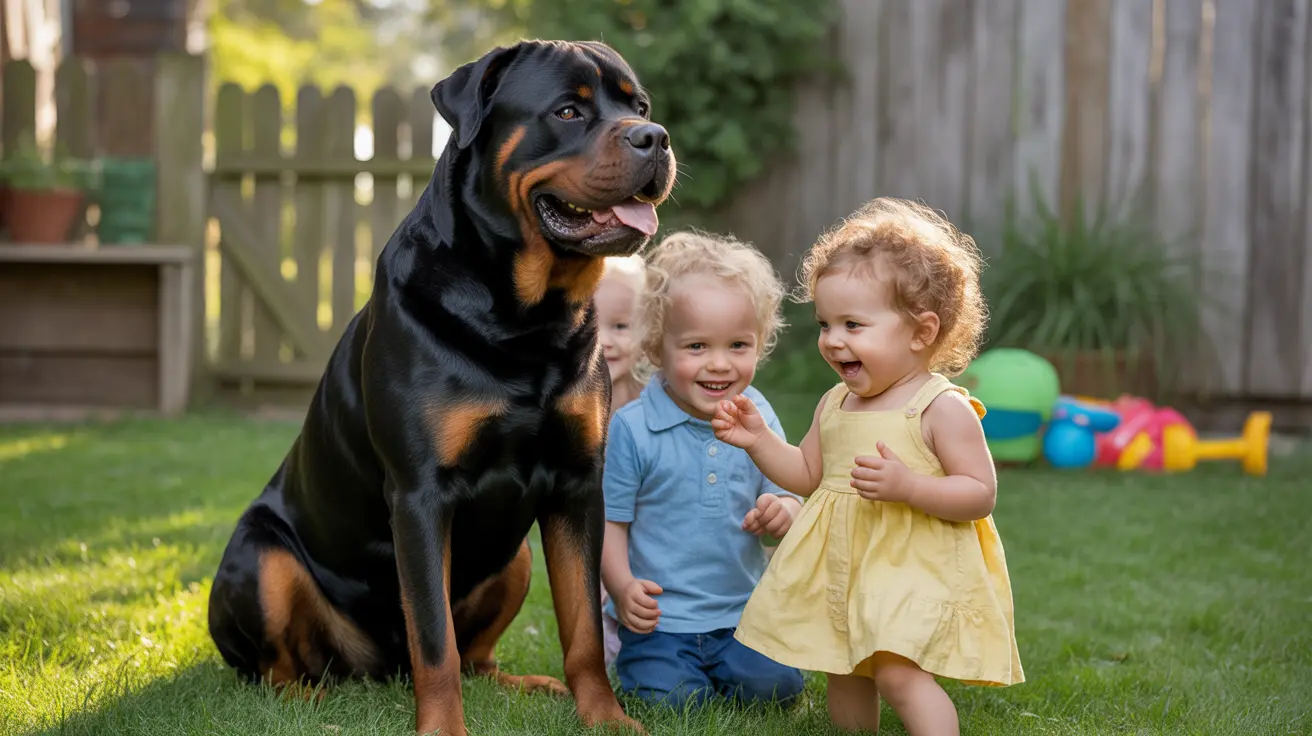Considering adding a Rottweiler to your family with children? These powerful, intelligent dogs have earned both devoted fans and concerned critics. Let's explore the real story behind Rottweilers and their compatibility with kids, backed by expert insights and practical guidance.
While Rottweilers can make excellent family companions, their success with children depends heavily on proper training, early socialization, and responsible ownership. This comprehensive guide will help you understand the unique characteristics of Rottweilers and how to ensure safe, positive interactions between these magnificent dogs and your children.
Understanding Rottweiler Temperament
Rottweilers are naturally loyal, protective, and affectionate with their families. When properly trained and socialized, they typically display remarkable patience and gentleness with children. Their confident, alert nature makes them natural guardians, while their intelligence enables them to learn appropriate boundaries.
However, their working dog heritage means they require consistent guidance to channel their protective instincts appropriately. Early exposure to various situations and people helps develop a well-balanced temperament.
Benefits of Rottweilers as Family Dogs
These powerful dogs offer several advantages as family companions. Their protective nature means they're naturally watchful of children, while their sturdy build makes them resilient enough for active play. Rottweilers are also highly trainable and eager to participate in family activities.
Their intelligence and desire to work make them excellent partners in various activities, from hiking to advanced training exercises, helping create strong bonds with all family members.
Essential Safety Considerations
Due to their size and strength, Rottweilers require careful management around children. Even well-intentioned play can result in accidental knockdowns, particularly with smaller children. Additionally, their protective instincts must be properly channeled through training to prevent overprotective behaviors.
Supervision is absolutely essential when Rottweilers interact with children, regardless of how well-trained the dog may be. This helps ensure both the child's safety and the dog's comfort level.
Training and Socialization Requirements
Success with Rottweilers begins with comprehensive training and socialization. These dogs need clear boundaries, consistent rules, and positive reinforcement from an early age. Professional training support can be invaluable, especially for first-time Rottweiler owners.
Socialization should include controlled exposure to children of different ages, teaching the dog appropriate ways to interact and play. Similarly, children must learn to respect the dog's space and signals.
Setting Up for Success
Creating a safe environment for both Rottweilers and children involves establishing clear boundaries and routines. This includes designated rest areas for the dog, supervised interaction times, and consistent rules about appropriate play.
Regular exercise and mental stimulation are crucial for preventing problematic behaviors. A tired Rottweiler is typically a well-behaved Rottweiler, especially around children.
Frequently Asked Questions
Are Rottweilers good family dogs with small children?
Rottweilers can be excellent family dogs with small children when properly trained and socialized. However, they require experienced ownership, consistent training, and constant supervision due to their size and strength. They're generally better suited for families with older children who can understand and follow dog safety rules.
How do I train a Rottweiler to be gentle with kids?
Start socialization early, expose your Rottweiler to children in controlled settings, and reward calm, gentle behavior. Use positive reinforcement training methods, establish clear boundaries, and work with a professional trainer if needed. Teach both the dog and children appropriate ways to interact.
What are the potential risks of having a Rottweiler if I have young children?
The main risks include accidental injuries due to the dog's size and strength, potential overprotective behaviors if not properly trained, and the possibility of territorial or resource guarding issues. These risks can be minimized through proper training, socialization, and supervision.
How can I socialize my Rottweiler puppy to get along with kids?
Begin socialization during puppyhood with controlled introductions to children of various ages. Arrange supervised play sessions, reward positive interactions, and gradually increase exposure to different situations. Ensure all interactions are positive and never force the puppy into uncomfortable situations.
What behaviors should I watch for in a Rottweiler to ensure it remains safe around children?
Monitor for signs of stress, resource guarding, excessive herding behaviors, or overprotectiveness. Watch for body language indicating discomfort, such as stiffening, growling, or avoiding interaction. Address any concerning behaviors immediately with professional help if needed.
Conclusion
Rottweilers can indeed be wonderful companions for families with children, but success requires dedication to proper training, socialization, and management. With the right approach, these loyal and intelligent dogs can become beloved family guardians, forming deep bonds with children while maintaining appropriate boundaries.
Remember that responsible ownership is key – commit to ongoing training, maintain consistent supervision, and create an environment where both your Rottweiler and children can thrive together safely.






